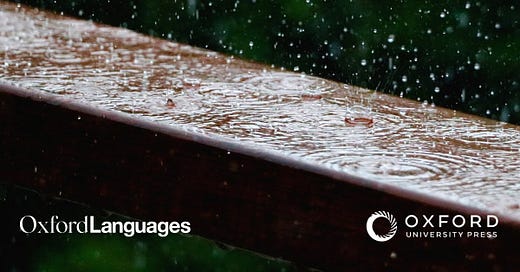Hey everyone! I learned something new today! And a new word! (not petrichor. I’ll explain:)
This vocab word was suggested to me in the middle of a sudden and brief downpour out at my ‘local’ the other day. Bartender Bri was adorably proud of her knowledge of the word, and proceeded to ask her colleagues and me if we knew what it meant, even as it pervaded the torrential air around us. I know this word well, and I I love it—it’s fun to say and it’s one of my favorite things to experience in the world too, so why not write about it today?
That’s Geosmin to You
Definition: Petrichor
Turns out I didn’t know the word as well as I thought I did: it does mean the smell of rain, but it means specifically the smell of rain after a hot and dry spell, or the smell of rain on stone, dry land, or pavement. That detail was one I didn’t know about petrichor.
The term “petrichor” comes from the Greek words petra (stone) and ichor (the ethereal blood of the gods).*
I had always thought petrichor referred to rain on pavement only, but no—any dry soil is what the compound word refers to. You’d think, if it meant pavement, it’d be a recently coined word. And it is, in fact, even though it means more than that; it was apparently invented in 1964, if my research serves me correctly. But there’s another word related to it that I’d never heard of before! It’s a connected term that describes one of the various chemicals that go into petrichor.
Definition: Geosmin
According to the sciencenotes.org article I found, there’s three components to the smell of petrichor: volatile oils from plant matter, ozone from lightning, and our secondary vocab word of the day: geosmin. What’s geosmin? It’s blue-green algae and cyanobacteria.
So really, petrichor is not the smell of rain, it’s more the smell of the earth the rain is hitting. Or, the smell of the above three chemicals.
The word [“geosmin”] stems from the Greek words geo (earth) and osme (smell).*
Cyanobacteria? I hardly know her…
Discussing the sudden downpour at the bar, one consensus abounded: we really do need the rain—that’s not just cliché in this state this month—the customary Colorado wildfires and intense dry heat have been way more extreme than normal this summer. The term ‘petrichor’ came up as we watched the clouds roll in over the smoke in the air, then he sky got gray and fat and burst into rain. Such a relief. As the rain came down in big plopping drops and then long lashing streaks, there were actually two smells: 1) petrichor; and 2) wood fire smoke. The whole sky smelled like pouring water over a campfire. I had to wait another drink’s worth of minutes to run across the street and back home.
As much as I am normally thankful for a nice arctic AC, it was sheer pleasure to get home and shut it off, flinging open the patio door and windows to the petrichor. I love rain. The sun here is so close and harsh, glaring down your neck through thin air—there’s no defense. It feels like it burns right through sunscreen (and often gets to you through winter months too, being reflected off snow). I have to wear my blueblockers pretty much all the time, indoors and out, because my eyes are so light in color and thereby that sensitive. Anyway, I’ve always got either sun or screens in my face, so. And I love pine smells on a hike as much as petrichor, as rare as the latter can be here in single-digit-humidity Colorado.
Maybe I love the rain so much because I grew up here and the sun is much more of a drag to me than the rain. I hear there is such a thing as reverse seasonal affective disorder, and I wonder if it’s something that I’m suffering from. My new friends in the Pacific Northwest were astonished to hear me long for the famous gray summer rain up there when I was guest actor for their summer Shakespeare festival. But I guess I ended up bringing my customary heat and sun up there instead, as it only rained once the whole two and a half months I was up there, and it was never cloudy. Sigh. At least it was humid. But then the mosquitoes. That’s the only advantage to Colorado’s dryness, I must admit: a dearth of bugs. And mold. Would I trade that for more petrichor? Nah, probably not.
*(both quotes and graphic from this article by Anne Helmenstine, June 2023)






Love these words! So physical and delightful.